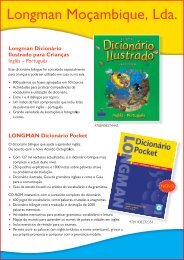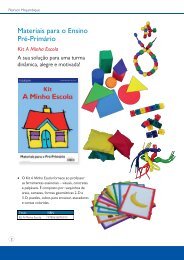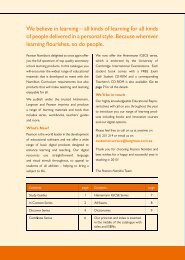New Windmills - Pearson
New Windmills - Pearson
New Windmills - Pearson
Create successful ePaper yourself
Turn your PDF publications into a flip-book with our unique Google optimized e-Paper software.
Shakespeare Ages 14-16 UK Years 10-11 US Grades 9-10<br />
Longman School Shakespeare<br />
for GCSE<br />
GCSE success in Shakespeare<br />
Fully updated to meet the needs of the latest GCSE specifications.<br />
Exclusive awarding-body specific support to help students realise their full potential.<br />
The most accessible texts with supportive notes, activities and advice to engage students.<br />
Remains the best value for money available.<br />
ACT 1 SCENE 1<br />
ACT 1 SCENE 1<br />
In this scene ...<br />
A street fight breaks out between the Capulets and the Montagues.<br />
The Prince stops the riot and threatens the death penalty for anyone caught<br />
fighting in Verona’s streets again.<br />
Romeo’s parents ask Benvolio why Romeo has been behaving strangely.<br />
Romeo tells Benvolio that he is in love with a girl who refuses to be won<br />
over.<br />
Two Capulet servants, Sampson<br />
and Gregory, brag about<br />
their part in the feud with the<br />
Montagues.<br />
Themes and issues<br />
What are Sampson and<br />
Gregory boasting about<br />
(lines 1 to 27)? What does<br />
this reveal about the way<br />
they view their sense of<br />
family honour?<br />
Performance and staging<br />
Lines 1 to 4 contain<br />
wordplay: to ‘carry coals’<br />
is to be humiliated,<br />
‘colliers’ (coal-miners)<br />
were considered dirty<br />
and dishonest, ‘choler’<br />
(pronounced ‘collar’)<br />
means anger, and a ‘collar’<br />
was also a hangman’s<br />
noose. Why might some<br />
directors cut these jokes in<br />
a performance? Why might<br />
others decide to keep them?<br />
s.d. bucklers: small shields<br />
1 carry coals: i.e. do work that is below<br />
us<br />
2 colliers: coal-miners<br />
3 choler: anger<br />
draw: i.e. draw our swords<br />
4 draw … collar: i.e. avoid hanging<br />
5 moved: made angry<br />
8 stand: i.e. fight<br />
11 take the wall: walk where the road is<br />
cleanest, i.e. show my superiority<br />
12–13 goes to the wall: is defeated by the<br />
strong<br />
14–15 weaker vessels: ‘the weaker sex’<br />
19 ’Tis all one: It makes no difference<br />
23 maidenheads: virginities<br />
25 They must … it: The ones who sense it<br />
are the ones who feel it (i.e. the maids)<br />
Questions on every page help<br />
focus students’ learning on the<br />
GCSE assessment criteria.<br />
A street in Verona.<br />
Enter SAMPSON and GREGORY (servants of the house of Capulet),<br />
armed with swords and bucklers.<br />
SAMPSON S<br />
Gregory, on my word, we’ll not carry coals.<br />
GREGORY G<br />
No, for then we should be colliers.<br />
SAMPSON<br />
I mean, an we be in choler, we’ll draw.<br />
GREGORY G<br />
Ay, while you live, draw your neck out of collar.<br />
SAMPSON<br />
I strike quickly, being moved.<br />
5<br />
GREGORY G<br />
But thou art not quickly moved to strike.<br />
SAMPSON<br />
A dog of the house of Montague moves me.<br />
GREGORY G<br />
To move is to stir, and to be valiant is to stand: therefore,<br />
if thou art moved thou runn’st away.<br />
SAMPSON<br />
A dog of that house shall move me to stand. I will 10<br />
take the wall of any man or maid of Montague’s.<br />
GREGORY G<br />
That shows thee a weak slave, for the weakest goes to<br />
the wall.<br />
SAMPSON<br />
’Tis true, and therefore women, being the weaker<br />
vessels, are ever thrust to the wall: therefore I will 15<br />
push Montague’s men from the wall, and thrust his<br />
maids to the wall.<br />
GREGORY G<br />
The quarrel is between our masters, and us their men.<br />
SAMPSON<br />
’Tis all one. I will show myself a tyrant. When I<br />
have fought with the men, I will be civil with the 20<br />
maids: I will cut off their heads.<br />
GREGORY G<br />
The heads of the maids?<br />
SAMPSON Ay, the heads of the maids, or their maidenheads –<br />
take it in what sense thou wilt.<br />
GREGORY G<br />
They must take it in sense that feel it.<br />
25<br />
13<br />
Sample page from Longman Romeo and Juliet<br />
What’s online?<br />
Heinemann Shakespeare<br />
Updated editions in this trusted Shakespeare series<br />
Thoroughly updated to meet the needs of the Key Stage 3 and GCSE classrooms.<br />
Enhanced accessibility for all students with clear navigation through the texts, spacious page<br />
design and new activities.<br />
Brand-new support and activities to match<br />
the new GCSE English 2010 curriculum.<br />
Durable hardback editions for longevity.<br />
What’s online?<br />
49
















